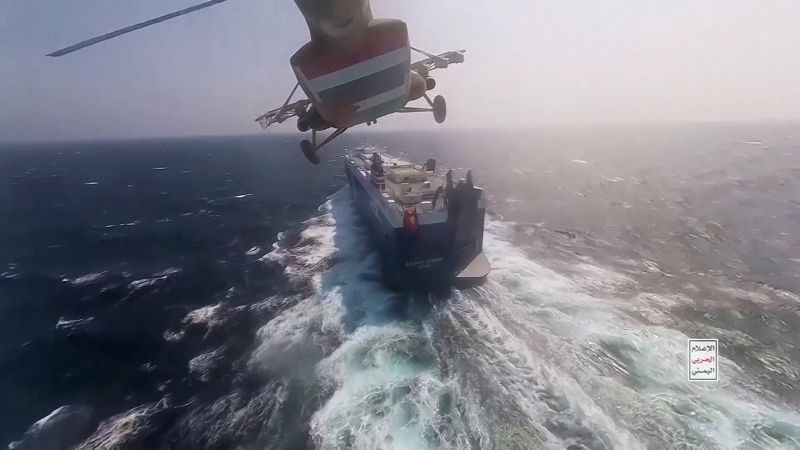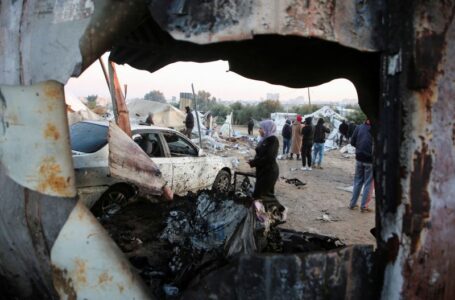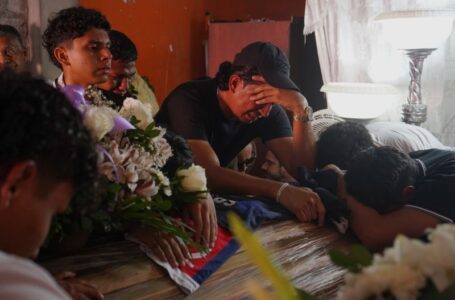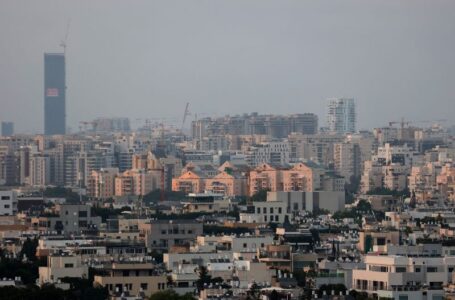Israeli strike kills 11 people, including head of Gaza police, Palestinian officials say
The Gaza conflict’s forgotten shipping crew held hostage in the Red Sea


Hope is fading for the imminent return of the international crew of the cargo ship hijacked by the Houthis in November, with a senior Filipino diplomat saying he does not expect a release until the war in Gaza is over, while the Houthis say the fate of the sailors is now in Hamas’ hands.
A Houthi-owned helicopter hijacked the Galaxy Leader cargo ship on November 19 in the Red Sea, as rebel gunmen laid siege to the vessel and took the ship’s crew of 17 Filipinos, two Bulgarians, three Ukrainians, two Mexicans and a Romanian hostage.
It’s now been more than 116 days since the hijacking, and according to a senior Filipino government official, there is no indication that the Houthis are open to releasing them until the hostilities end.
“There’s really not much that can be done to influence them, because the word we get from the Houthis is … that they will keep holding the ship, and all the crewmen, until we see an end to the hostilities in Gaza,” said Eduardo de Vega, the Filipino foreign affairs official overseeing millions of Filipino migrant workers.
Iran-backed Houthi rebels have been striking ships in the Red Sea since late last year, which they say is revenge against Israel for its military campaign in Gaza.
The Houthis said Thursday they had handed over the decision about the release of the Galaxy Leader to Hamas.
De Vega said the Houthis potentially also want official recognition of them as the government of Yemen in exchange for the hostages, but that’s unlikely to happen.
“It will be difficult for any government to recognize a government which attacks ships on the sea,” said de Vega. So, he said, “there is no point to negotiate,” except to ensure humane conditions for the hostages.
The Philippines sends nearly half a million seafarers worldwide throughout the year, making up more than one-fifth of maritime manpower. The large numbers mean Filipinos are disproportionately exposed to the dangers posed by Houthis targeting ships in the Red Sea.
Following the hijacking, video released by the militant group showed Houthi commanders greeting the crew and promising to treat them as guests.
“Anything that you need we are ready to provide it for you,” one of them is heard telling the seafarers in the clip.
De Vega says that the crew is being fed – some have even reported weight gain – and there’s no indication of violence. They’re allowed brief, weekly calls with their families, although the identities of the hostages have been kept from the public.
Most of the crew, and all the Filipinos, are being held on the ship itself and have some freedom to move around on deck. Some other crew members, he said, have at times been held onshore.
“I think it’s in the interest of the Houthis to treat them well. Those people are victims, at the end of the day,” said Mohammed Al-Qadhi, a Cairo-based Yemeni conflict analyst. “They don’t want them to create a bad image about themselves.”
The Philippines does not have official direct diplomatic contact with the Houthis, but works through an “honorary consul,” a Yemeni national given special status to represent the Philippines, who was able to visit the hostages in January, de Vega said.
But since the honorary consul is in Aden, home to the internationally recognized Saudi-backed government of Yemen that are rivals to the Houthis, de Vega said it’s a “labyrinthian maze” to get access.
Al-Qadhi suggests that even when the war is over, the Houthis may not immediately release the hostages.
“They don’t want to give concessions right now without getting anything in return, so, I think it’s not likely that they are going to be released unless there is a bigger deal being orchestrated, internationally, regarding Gaza or even with the Houthis themselves,” he said.
Normally used to transport vehicles worldwide, the giant roll-on/roll-off vessel has now become a tourist attraction for curious locals who are shuttled out to the massive vessel in small boats.
According to satellite data, about two weeks ago, it was moved from about two kilometers offshore, to just 500 meters now from Yemen’s western port city of Hodeidah.
First fatal attack
Yemen has been plagued by years of civil war, deepened by foreign proxy rivalries, and remains one of the Middle East’s poorest nations.
Years of conflict have sparked one of the world’s worst humanitarian crises, leaving hundreds of thousands dead, Yemen divided and parts of the country in famine.
The Houthi attacks on merchant shipping have impacted one of the world’s busiest trade arteries through the Suez Canal, forcing many companies to redirect vessels and crew on the much longer route around Africa.
Data shared by Ambrey Analytics indicates there have been nearly 100 incidents involving hostile activity towards ships in the Red Sea and Bab al-Mandab Strait area since the beginning of the conflict.
Twenty-three ships have been physically damaged by Houthi missiles or drones and injuries among crew members have been reported on three vessels following such attacks. One ship – the British-flagged Rubymar – has sunk almost completely following a strike by a Houthi missile in late February.
The United States and Britain have conducted multiple rounds of air strikes on Houthi positions in Yemen since February but that has not stopped the attacks.
Two Filipinos and a Vietnamese crew member were killed in a Houthi strike on the M/V True Confidence on March 6. The vessel was hit by a Houthi anti-ship missile and fire quickly spread on board. The remaining crew was rescued by the Indian Navy, which took them to Djibouti for treatment.
Following the strike, Houthi spokesperson Yahya Sarea said the ship was targeted because it was American.
“Operations in the Red and Arab Seas will not stop until the aggression stops and the siege on the Palestinian people in the Gaza Strip is lifted,” he said.
The bodies of those presumed dead remain onboard the ship and are now being transferred to the nearest port, according to de Vega.
“One family is still holding hope. Until they see the remains of the loved one, they continue to hold hope. Miracles do happen,” he said.
Most of the Filipino crew members on board returned to Manila on Tuesday, reuniting with their families after their ordeal at sea.
“It is saddening and horrible because we were together [for a long time] and suddenly this [attack] happened. It’s very painful for us, especially for the families,” Mark Dagohoy, one of the ship’s crew members, told journalists after their return.
The fatal strike has marked a significant escalation of the Houthi’s attacks on Red Sea shipping that has endangered the lives of ordinary seafarers working thousands of miles away from their families on weeks or months-long stints at sea.
Crew members, mostly from the Global South, on board vessels now passing through the Red Sea face the risk of death, injury and capture as Western navies deploy costly anti-ship missiles and other weapons to intercept the Houthi attacks.
Industry standards dictate that crew are supposed to be paid double time for work in designated “warlike or high-risk areas,” and they should also have the right to say no to the journey and be repatriated at the company’s cost.
At the time of the attack, the ship was officially owned by a Liberian-registered company, but according to the Financial Times, it had been sold by an American private equity firm, Oaktree Capital, just days earlier.
Oaktree Capital declined to comment when asked about whether it had links to the vessel.
De Vega says initial indications are that the crew was given the choice not to proceed, but it’s not clear if they knew the ship had US ties when they boarded.
“[Crew] are frequently transferred from ship to ship. It’s the manning agency, which decides that and they had full trust in the manning agency. [Crew] as a general rule might not even be aware of the ownership of the ship that they’re traveling on,” de Vega said, though ideally, they should be.











